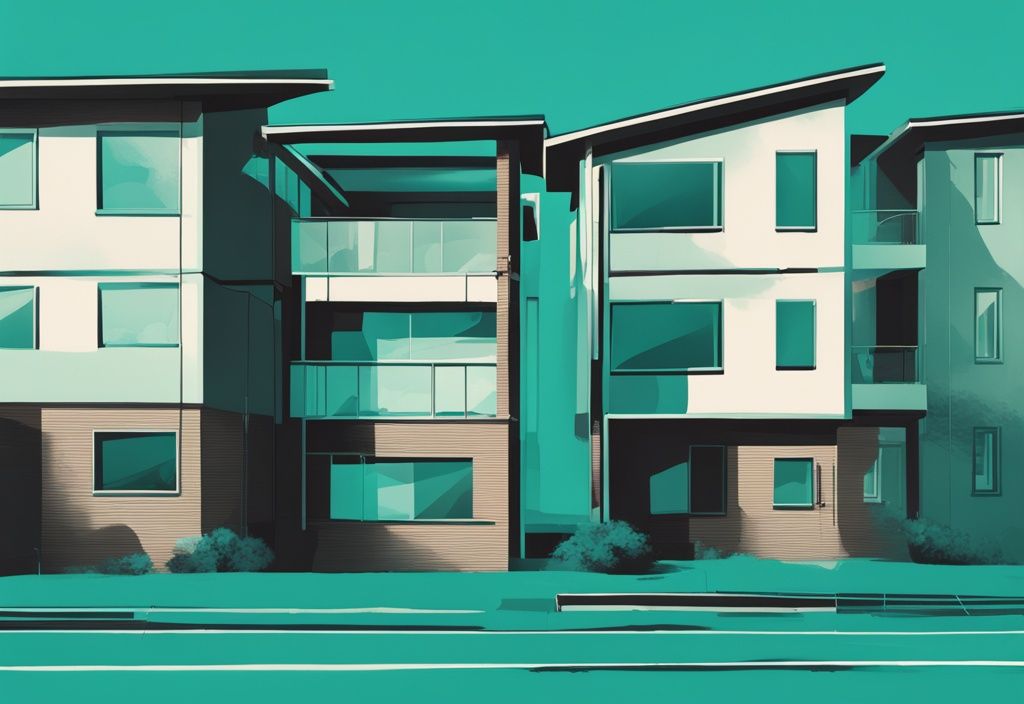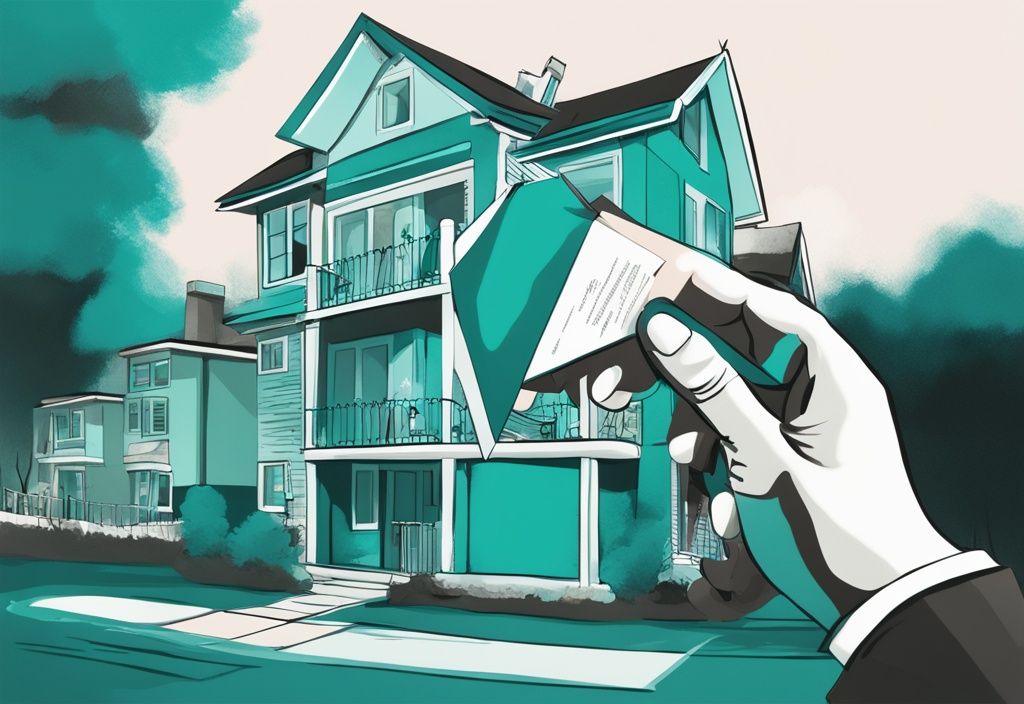Ever felt oblivious to rapid legal changes that could affect your property ownership? Well, the “grandfather clause in real estate” might just be your superhero. It’s that critical beacon of light in the turbulent ocean of real estate laws, protecting you from any sudden legal storms.
In this enlightening piece, I’ll pull back the curtains on the intricacies and advantages of this tool. Navigating real estate’s ever-changing landscape doesn’t have to be daunting, especially armed with the knowledge of how to safeguard your assets.
So, whether you’re dipping your toes into property investment or an old hand, read on! Through my experiences, I’ll guide you on how the grandfather clause could apply to your property. Buckle up for a journey that could revolutionize your real estate investments!
Defining the Grandfather Clause in Real Estate
The role of a grandfather clause in real estate is essential for property owners navigating changes in zoning laws and other regulations.
The Concept and Function of a Grandfather Clause
The concept of the “grandfather clause” in real estate has evolved significantly since its origins in post-Civil War America, where it was initially tied to voting rights. Today, this clause is a cornerstone for protecting property owners against new zoning laws.
A grandfather clause in real estate essentially allows existing property owners to keep their current rights and practices even when new regulations come into play. Imagine owning a charming old house on a large lot in a neighborhood that’s just been rezoned to prohibit such structures. Thanks to a grandfather clause, you’d still be able to enjoy your property as is, without having to make costly changes to comply with the new rules.
These protected rights often relate to zoning, land use, or building codes. When a property is considered in “legal non-conforming use” or “legal non-complying use,” it means the property doesn’t meet the current regulatory standards but is allowed to continue its existing use. Picture it like a vintage car that doesn’t meet modern emission standards but is still allowed on the road because it’s been well cared for and grandfathered in.
This provision is key in avoiding unconstitutional “takings” under the Just Compensation Clause of the Fifth Amendment. Without grandfather clauses, property owners could be compelled to give up certain rights without fair compensation, leading to legal battles and financial losses. For example, imagine being forced to demolish part of your home without any financial help to do so. If you’re navigating the world of property ownership, it might be interesting to explore how much real estate agents earn by clicking here. It’s easy to see why these clauses are so necessary.
Grandfather clauses provide stability and predictability for property owners by protecting pre-existing property uses from new laws and regulations. This stability is particularly valuable in real estate, as it allows for continuity and guards against sudden, potentially costly changes driven by new legislative measures. Think of it as having a safety net that protects your investment from unexpected changes. For those new to the industry, understanding the basics, such as what is a blind ad in real estate, can further enhance your knowledge and preparedness.
In essence, the grandfather clause in real estate acts as a buffer, enabling property owners to retain their rights and uses, ensuring both legal and financial stability.
Historical Background of the Grandfather Clause
The Origins of the Term and How It Has Evolved
The term “grandfather clause” has an intricate history, tracing back to post-Civil War America. Originally, it was tied to voting rights legislation that aimed to include some groups while excluding others. Fast forward to today, and you’ll find this term woven through various legal fields, including real estate law.
Initially, the grandfather clause was a legal tool to maintain stability by allowing existing practices to continue even when new laws were introduced. Imagine living through a time of rapid change—this clause was like a reassuring anchor, keeping communities steady when new regulations could have otherwise caused chaos.
In real estate, a grandfather clause is invaluable. It allows properties developed or utilized under older regulations to remain compliant, despite new zoning laws or building codes. Think of it as a safety net for property owners, ensuring they don’t face abrupt changes or financial burdens because of new rules.
These clauses offer a lifeline to property owners by safeguarding their established rights. They enable properties to continue operating under previous regulations, avoiding sudden enforcement of new restrictions. This lends stability and predictability, two essential elements for anyone engaging in long-term real estate planning and investment.
Consider it this way: The grandfather clause in real estate is like a cherished family heirloom, passed down to provide a sense of security and continuity within changing times. It helps property owners sleep a little better at night, knowing they’re protected from unexpected regulatory shifts.
So, whether you’re a seasoned investor or just dipping your toes into the real estate world, understanding the nuances of the grandfather clause can be a game-changer. It not only preserves property rights but also nurtures a reliable environment for growth and planning.

Highlights: How Grandfather Clauses Benefit Property Owners
Protection of Property Rights and Avenue for Stability
Grandfather clauses in real estate are like a safety net for property owners, ensuring that their current property uses can carry on without interruption, even when new zoning or land use regulations come into play. These clauses provide a sense of continuity and stability that’s invaluable for both property owners and developers. Think of it as a promise that your investment and how you use your property won’t face sudden, unforeseen changes. This helps maintain the character and use of properties, which in turn supports the overall stability of the community. By shielding current property owners from being penalized by new regulations, these clauses ensure fairness and protect long-term property rights.
Financial Advantages and Risk Mitigation
Grandfather clauses bring noteworthy financial perks and help in risk management for property owners. By insulating property owners from the costs of complying with new regulations, these clauses can prevent hefty financial hits. Properties with grandfathered rights also tend to be more valuable, owing to their unique allowances that catch the eye of potential buyers. It’s like having a bonus feature that others don’t have, making your property more attractive. This stability is a big plus for long-term financial planning and real estate investments, suggesting that your property’s use will stay consistent over time despite any regulatory changes. Moreover, grandfather clauses help avert risks related to sudden changes in property maintenance and use, creating a more predictable and secure environment for investment. This kind of risk mitigation is critical for keeping property value steady and boosting owner confidence.
Legality of Grandfather Clauses in Real Estate
Implications of Local Government Decisions
Local government decisions play a pivotal role in defining which properties qualify for a grandfather clause in real estate. These decisions hinge on municipal zoning bylaws, which detail compliance specifics.
Imagine you own a charming, vintage house with smaller setbacks than current regulations allow. Thanks to grandfathered rights, you can keep those unique features without facing penalties. However, these permissions aren’t forever. They undergo periodic reviews and must meet public safety and health standards.
Local ordinances with clear definitions make life easier for property owners. You can understand and meet the conditions that protect your rights, which brings a sense of security in maintaining your property without unexpected hassles.
The Interplay between Zoning Laws and Grandfather Clauses
Zoning laws and grandfather clauses work together to balance historical property rights with new legislative demands. Think about it this way: when fresh zoning laws bring in new rules, grandfather clauses let old, compliant conditions stick around. This means your property can keep existing features even if new zoning regulations are stricter.
This relationship is key in ensuring your property rights are respected, while still embracing updates meant to boost public health and safety. Yet, this balance often demands legal help to navigate the complexities.
For example, say your property usage was okay under old rules, but now you need to check if it aligns with the new legal setup. Keeping this balance between your rights and the evolving community needs can be tricky but manageable with the right advice.
The world of real estate laws can seem daunting, but understanding these clauses and their interactions with zoning laws helps you keep your property compliant and protected.
Real World Situations: Grandfather Clauses in Action
The practical implications of a grandfather clause in real estate become evident through various case studies. These real-world examples highlight how these clauses impact property decisions and provide critical protections for existing properties and businesses.
Case Studies of Grandfather Clauses Influencing Property Decisions
Imagine living in a charming, small town that has just revised its zoning laws to increase side yard setback requirements. Properties established before this change continue to use their original, smaller setbacks. These homes can maintain their existing conditions without facing penalties for non-compliance with the new law. This protection is the direct result of a grandfather clause in real estate, ensuring homeowners aren’t unfairly burdened by new regulations.
Another compelling example involves a commercial business deeply rooted in a community suddenly finding itself in a newly zoned residential area. Thanks to the grandfather clause, this well-established business is allowed to continue its operations despite the zoning shift. Without such a clause, the business might have been forced to relocate or even close, but instead, it enjoys financial stability and can keep serving the community.
Grandfather clauses also play a vital role in the construction industry. Developers and property owners often face new building codes after projects are already underway. Fortunately, these clauses ensure that construction can proceed under the old regulations, avoiding unexpected compliance costs and allowing projects to finish as planned. This stability is crucial for maintaining trust and feasibility in real estate development.
The impact of grandfathered properties on market value is significant. Properties benefiting from unique allowances due to these clauses frequently see an increase in market value. Buyers and investors are particularly attracted to the freedoms these properties offer, making them highly sought after in the real estate market.
Specific legal contexts also rely on grandfather clauses. For instance, Washington law (Section 9.41.300 RCW) permits businesses selling firearms to continue operations despite new zoning restrictions that might otherwise shut them down. This legal shield maintains the status quo for such businesses in the face of evolving local regulations.

In each of these scenarios, a grandfather clause in real estate serves as a pivotal tool, balancing the enforcement of new laws with the protection of existing property rights. This equilibrium promotes stability and continuity within communities, proving the invaluable nature of these clauses in the ever-changing landscape of real estate.
Overcoming Challenges Associated with Grandfather Clauses
Sometimes, dealing with a grandfather clause in real estate can feel like navigating a maze—and not the fun kind. These clauses can shake things up in terms of neighborhood consistency and property values, and even make legal waters a bit murky. But don’t worry, we’re breaking down these challenges and looking at real, actionable solutions.
Achieving Parity in Neighborhood Standards
A grandfather clause in real estate often leads to situations where new property owners face stricter regulations compared to those enjoying grandfathered rights. This inequality can disrupt community harmony and equitable treatment, creating a patchwork of lenient and stringent properties side by side.
Think about it like this—it’s like having a neighborhood block where half the houses can paint without permission, while the other half needs special approvals. To fix this, municipalities need to create standards that balance the protection of these clauses with fair development principles.
Detailed reviews of existing ordinances and adaptive measures are key. By ensuring that all property owners are treated fairly, while maintaining the integrity of neighborhood standards, we can foster a community where both old and new property owners coexist harmoniously.
Dealing with Fluctuating Property Values
Properties with grandfathered rights often become hot commodities due to their unique allowances, which can drive up market values. However, this can lead to imbalanced markets where properties without such rights may depreciate.
Imagine two houses: one can run a business due to a grandfather clause, making it more valuable, while its neighbor can’t, leading to potential devaluation. Changes in zoning laws or the potential loss of these rights can also impact property values, creating financial uncertainty for owners and investors.
Investors should be proactive—carefully assess potential future regulatory changes and incorporate the conditional nature of these clauses into their long-term financial planning. This helps safeguard investments and ensures stability despite the ever-evolving real estate landscape.
Navigating Legal Terrain and Avoiding Disputes
The legal side of the grandfather clause in real estate can be tricky. Legal disputes can pop up if the grandfathered status of a property is challenged, requiring astute interpretation of regulations.
A good analogy is traveling through an unfamiliar city—you wouldn’t do it without a GPS or map. Similarly, continuous updates and reviews of zoning laws are crucial. By working closely with seasoned real estate lawyers, property owners can better understand their rights and obligations, effectively avoiding legal challenges related to their grandfathered status.
Staying informed and compliant ensures you’re always a step ahead, safeguarding your interests and keeping legal disputes at bay.
Further Scrutiny: Limitations and Restrictions on Grandfather Clauses
Grandfather clauses in real estate have their fair share of limitations and restrictions that can affect how and when they apply. Let’s dig into the specifics to better understand what conditions and considerations come into play.
Understanding the Non-automatic and Conditional Nature of Clauses
Grandfather clauses in real estate are inherently conditional rather than automatic, meaning property owners must meet various criteria to maintain these privileges.
For instance, one common requirement is maintaining consistent ownership; if the property gets transferred to another owner, the grandfathered status can be lost. Think of it like a family recipe—you can’t change hands without potentially losing that special touch.
Another critical element is the uninterrupted use of the property. If the property is no longer used as it was originally intended, those grandfathered rights can be revoked. Imagine a classic diner turning into a hardware store; that switch can nullify the pre-existing rights.
Additionally, obtaining and maintaining any necessary permits is vital. Failure to do so can also strip away those grandfathered rights. Sometimes, the property may even need periodic approval from local authorities to ensure ongoing compliance with existing conditions. It’s like keeping your car’s registration up-to-date to stay road-legal.
Considering Public Safety and Health Factors
Public safety and health considerations significantly impact the applicability of grandfather clauses in real estate. Municipalities often conduct reviews to ensure that properties comply with current safety standards, even if they benefit from grandfathered rights.
In cases where public health or safety is compromised, these grandfathered rights can be overridden to address these concerns. While temporary exemptions might be offered, they generally come with strict conditions prioritizing public well-being.

This ensures that while grandfather clauses protect property owner rights, they do not do so at the expense of community safety and health standards. It’s like getting an extension on a school project; it helps, but you still have to meet all the necessary requirements to get a passing grade.
Navigating Grandfather Clauses: Important Steps for Owners and Developers
Securing a firm grasp of grandfather clauses in real estate can feel overwhelming, but it’s an essential part of property ownership and development. Below, we break down the pivotal elements to consider, especially from a legal and regulatory standpoint.
The Role of Legal Advice in Relation to Grandfather Clauses
Teaming up with experienced real estate lawyers is your best bet to fully understand and effectively apply a grandfather clause in real estate. These legal pros offer invaluable insights into securing grandfathered rights, helping you navigate the maze of local and state regulations. Think of them as your guiding light when disputes arise, validating your property’s grandfathered status to ensure it’s compliant.
Regular consultations with a knowledgeable attorney keep you in the loop with both existing laws and any new changes on the horizon. This not only safeguards your property’s grandfathered privileges but also gives you peace of mind, knowing your property is in good hands.
Staying Updated on Local and State Regulations
It’s crucial to continuously review your property concerning local and state codes to maintain its grandfathered status. Being proactive about changes in zoning laws and regulations can save you from unwelcome surprises down the road.
Make it a habit to use local government resources and advisories. This ensures you remain compliant while protecting your grandfathered rights. Plus, staying ahead of the curve positions you advantageously for any future developments in zoning legislation. Overall, this proactive approach ensures the sustainability of your property’s unique allowances under the grandfather clause in real estate.
FAQ
Defining a Grandfather Clause in Real Estate
Grandfather clauses in real estate are like a protective shield for certain properties. These legal provisions allow properties to keep operating under old regulations instead of adapting to new ones. Think of it as a vintage car that doesn’t have to meet modern emissions standards because it’s cherished for its classic status.
The Impact of Grandfather Clauses on Property Value
A property with grandfathered rights can be a goldmine. They often gain value due to their unique permissions that others lack. But, it’s not all sunshine and rainbows. Future zoning law changes can cast a shadow of uncertainty, making thorough market analysis a must to gauge true value.
Conditions Under Which a Grandfathered Property May Lose Its Status
Grandfathered status isn’t permanent and can vanish under certain conditions. If there’s a break in how the property is used, a change in ownership that doesn’t honor the original conditions, new public safety or health laws, or non-compliance with local authority requirements, the special status can be revoked. Staying on top of compliance is key.
Advantages of Grandfather Clauses for Property Owners
Imagine a safety net that cushions you from new law costs – that’s what grandfather clauses do for property owners. They offer financial stability and can even boost market value by allowing continued use without sudden disruption. This protection is a beacon for long-term planning and stability.
Possible Limitations of Grandfather Clauses
However, these clauses aren’t bulletproof. Local government rules and periodic reviews can impact them. They hinge on adhering to the original conditions religiously and aren’t valid if public safety or health is at risk. This can create uneven property use and shift neighborhood standards, leading to potential disparities.
Conclusion
Grandfather clauses in real estate are like a safety net, catching property owners before they fall into the costly and complex world of new regulations, as they play a crucial role in preserving property rights, which define what owners can do with their property, including holding on to it or transferring it to another party, as explained in detail on property rights. These clauses are the crucial guardians of property rights, offering exemptions from freshly minted laws, ensuring that you don’t need to suddenly upend how you’ve been using your property. This stability often means financial peace of mind, as you’re spared from the hefty expenses tied to adhering to new rules.
However, the benefits of grandfather clauses come hand in hand with certain strings attached. Think of it like enjoying a free VIP pass, but only as long as you stick to the fine print. This might mean keeping the property’s original use, holding onto ownership, or sticking to the terms that initially earned you that protection. If you deviate from these conditions, it’s like losing your VIP status, leaving you wide open to new, potentially stricter regulations. One thing to keep in mind is that these clauses aren’t a given, much like understanding what a short sale in real estate involves. They’re often under the watchful eyes of local authorities who juggle protecting your property rights with ensuring the broader community’s safety and health. It’s like having a referee ensuring fair play, but sometimes the rules need to be revisited.
For property owners and developers, staying compliant with these conditions is the golden ticket to preserving your grandfathered rights. Getting expert advice from seasoned real estate lawyers becomes invaluable in this journey, helping you navigate through the maze of zoning and land use regulations. Keeping up with the latest local and state laws is essential to maintaining your protection under these clauses.
In the end, it’s all about balancing the scales between safeguarding your property and ensuring public safety. By grasping these nuances and adhering to the conditions set forth, you can effectively leverage grandfather clauses to your advantage, making the most of their protections while staying on the right side of the law.
Hi, I’m Alex Harper, a real estate expert with over ten years of experience in property management and legal advice. My passion is making the often complicated world of real estate understandable. I share practical tips and simple solutions to help you make better decisions – whether you’re buying a home, renting or just want to learn more about the industry. With my knowledge and experience, I want you to feel well-informed and confident in your real estate projects. Let’s tackle this together!




